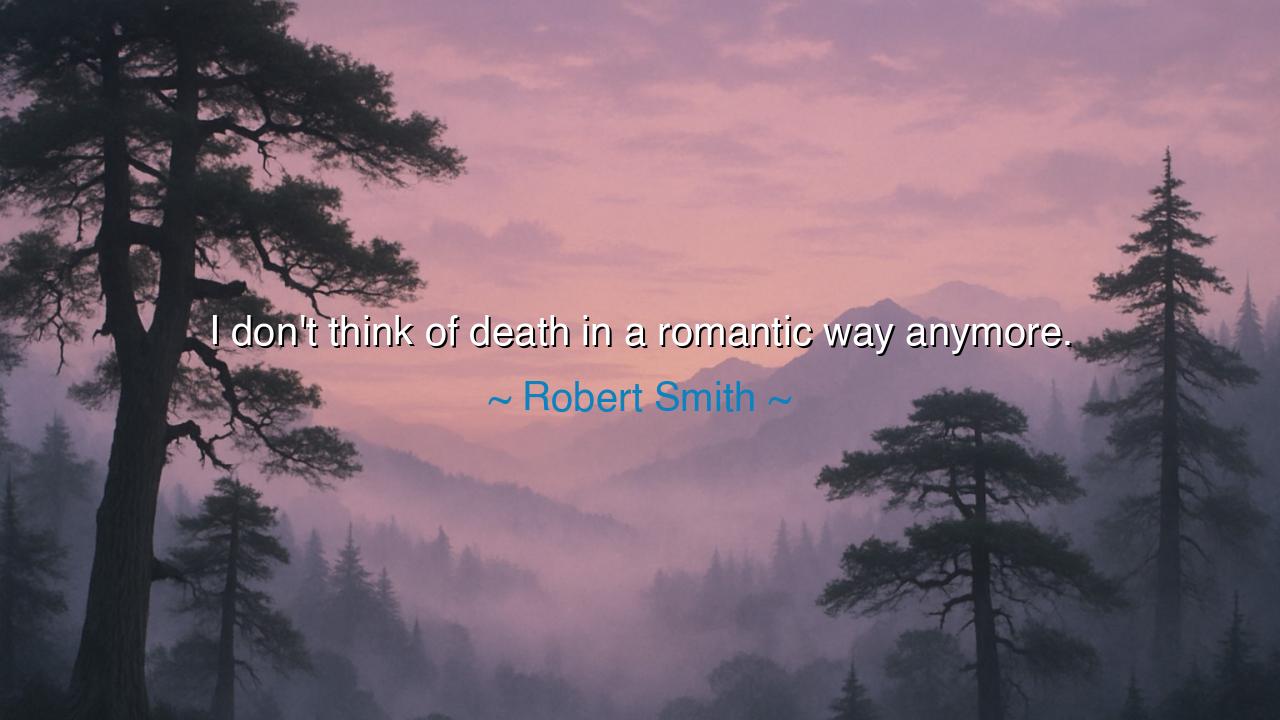
I don't think of death in a romantic way anymore.






“I don’t think of death in a romantic way anymore.” These words, uttered by Robert Smith, frontman of The Cure, echo with the quiet wisdom of one who has looked too long into the shadows and finally understood their nature. In his youth, Smith, like many poets and dreamers, saw death as a beautiful abstraction — a mysterious release, a tragic end wrapped in the poetry of melancholy. But time, as it does to all, stripped away illusion. Death ceased to be a muse and became what it has always been: a threshold of truth, neither cruel nor kind, simply inevitable.
Once, the ancients too saw death as a god cloaked in beauty. The Greeks called her Thanatos, the Romans whispered of Mors. In marble halls and on battlefield plains, men spoke of dying gloriously, of noble ends and songs sung by bards. Yet, the wisest among them — Socrates, who drank the hemlock with calm acceptance — understood that death was not a lover to be wooed, but a silence to be met with clear eyes. To see death without romance is not to scorn life, but to finally honor it. It is to stand before the infinite and say, “I will live while I am here.”
Consider the story of Marcus Aurelius, the Roman emperor and philosopher. Amid plague, betrayal, and loss, he wrote in his journal: “Do not act as if you were going to live ten thousand years. Death hangs over you. While you live, while it is in your power, be good.” He, too, ceased to see death as a distant poetic idea. It was not a distant tragedy but a constant teacher. His acceptance did not make him morose — it made him present, just, and strong. The man who no longer romanticizes death begins to revere life with holy fire.
Robert Smith’s words come from this same awakening. The young artist who once painted despair in song came to understand that death’s allure fades when one has truly suffered, and yet chooses to keep living. To think of death in a romantic way is often the privilege of those untouched by its hand. But once you have seen a friend lowered into the earth, once you have held the trembling hand of one departing — then you know. Death is not beautiful. What is beautiful is the courage to remain, to endure, to continue creating light amidst decay.
There is a power in this revelation. The ancients called it amor fati — the love of one’s fate. To cease romanticizing death is to embrace the entire spectrum of existence: the pain, the joy, the mundane, the transcendent. It is to live not for a grand finale but for the sacred now. The one who no longer dreams of death’s embrace begins to see the divine even in the smallest breath, in the sound of rain upon the roof, in the laughter of strangers passing by.
The lesson is this: do not seek beauty in endings, but in continuance. Do not long for oblivion, but for awareness. Let death be your compass, not your destination. When you wake, remember that the day was not promised to you — and so every sunrise is a miracle. When you love, do not hold back, for time is brief. And when you create, let your art be not a lament of despair, but a hymn to persistence.
So live as the wise lived: with eyes open to both the shadow and the flame. Live so fully that when death at last comes, it will find you not yearning for it, but greeting it as an old acquaintance after a feast well enjoyed. For only those who have ceased to see death as romance are truly free to live as poets of life.






AAdministratorAdministrator
Welcome, honored guests. Please leave a comment, we will respond soon